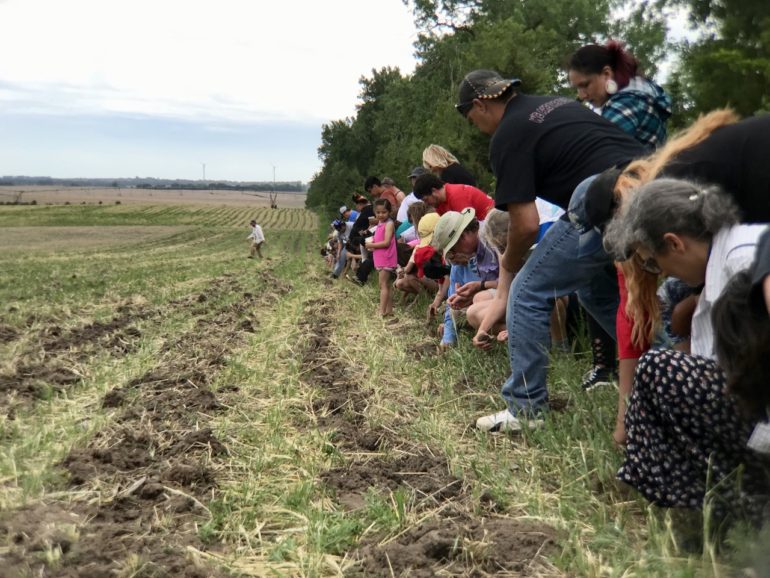Seeds Of Resistance
Ponca corn planted in path of Keystone XL Pipeline
Monday, June 10, 2019
By Kevin Abourezk
NELIGH, Nebraska – As a light rain turned the soil beneath their feet soft, nearly 65 water protectors and farmers stepped forward from a long line and dropped corn seeds into freshly ploughed earth here Saturday.
As they did, some said silent prayers. Some held the corn seeds up to the sky and whispered into the wind. Others talked and laughed with one another.
For the sixth time, they gathered on Art and Helen Tanderups’ farm in northeast Nebraska to plant sacred Ponca corn, or “seeds of resistance.”
“This isn’t just a symbolic gesture that we’re doing,” said Mekasi Horinek, a citizen of the Ponca Tribe of Oklahoma and son of Casey Camp-Horinek, a longtime Native rights activist. “It’s actually a ceremony that you’re participating in. Every seed that you plant should be a prayer.”
A young woman passes burning sage to volunteers gathered on Saturday, June 8, 2019, as part of the sixth annual Ponca sacred corn planting ceremony on Art and Helen Tanderup’s farm near Neligh, Nebraska. Photo by Kevin Abourezk
It was a historic day at the Tanderup farm, where those gathered to help plant the Ponca corn did so on land now owned by the Ponca tribes of Nebraska and Oklahoma.
Last year during the corn planting ceremony, the Tanderups signed a deed to the tribes for a 1.62-acre field where volunteers have planted the Poncas’ corn each year since 2014. They later decided to increase the size of that land donation to 10 acres.
“Now we’re planting it on land that is owned by the Ponca nation, and that just warms my heart to know that we’re planting Ponca corn on Ponca land,” Art Tanderup said on Saturday. “Each of those seeds is blessed and will grow and will resist.”
Native youth greet each other on Saturday, June 8, 2019, as part of the sixth annual Ponca sacred corn planting ceremony on Art and Helen Tanderup’s farm near Neligh, Nebraska. Photo by Kevin Abourezk
Saturday’s ceremony also included a request for prayers for pipeline opponents who are battling illness, including Frank LaMere, a Winnebago activist who is fighting cancer.
The Tanderups’ farm is located on the Ponca Trail of Tears, the path the tribe took 141 years ago when the federal government forcibly removed them from their land in northeast Nebraska and sent them to live in Indian Territory in Oklahoma. The farm is also along the proposed path of the Keystone XL Pipeline, a controversial project opposed by environmentalists and landowners along its path.
The 1,179-mile pipeline would link the oil fields of Canada’s Alberta province to refineries in the United States. Former President Barack Obama rejected the project, but President Donald Trump reversed that decision after gaining office in 2017 and issuing a presidential permit for the project.
A Native mother carries her child as she plants corn on Saturday, June 8, 2019, as part of the sixth annual Ponca sacred corn planting ceremony on Art and Helen Tanderup’s farm near Neligh, Nebraska. Photo by Kevin Abourezk
Pipeline opponents had filed a lawsuit over the pipeline’s environmental impacts, but last week, the Ninth Circuit Court of Appeals dismissed the legal challenge, ruling the case was no longer active due to President Trump’s revocation of the permit at the center of the case. In March, Trump issued a new presidential permit for Keystone XL, in an effort to spur construction of the pipeline.
Previously, a federal district court in Montana determined the environmental review for the pipeline was incomplete and blocked construction until the government complies with the law. Jane Kleeb, president of Bold Nebraska, said President Trump took the extraordinary step of issuing a new permit to undermine the Montana court’s decision.
Despite these moves, TC Energy (formerly TransCanada), the pipeline’s developer, recently informed investors that it was too late to begin construction of the pipeline in 2019.
Art and Helen Tanderup constructed a medicine wheel-shaped circle on their farm near Neligh, Nebraska, to honor various opponents of the Keystone XL Pipeline, including Frank LaMere, Chief Arvol Looking Horse and the Ponca tribes of Oklahoma and Nebraska. Photo by Kevin Abourezk
Kleeb said pipeline opponents plan to file a lawsuit challenging Trump’s newest permit.
In addition, the Nebraska Supreme Court is still considering a lawsuit that challenges the approval of a Keystone XL route across the state.
“You can’t get much more evil than what President Trump and his legal team did,” Kleeb said last week. “They knew we were winning in the courts, and so they withdrew that permit that we were suing on and created a whole new presidential permit to approve Keystone XL.”






